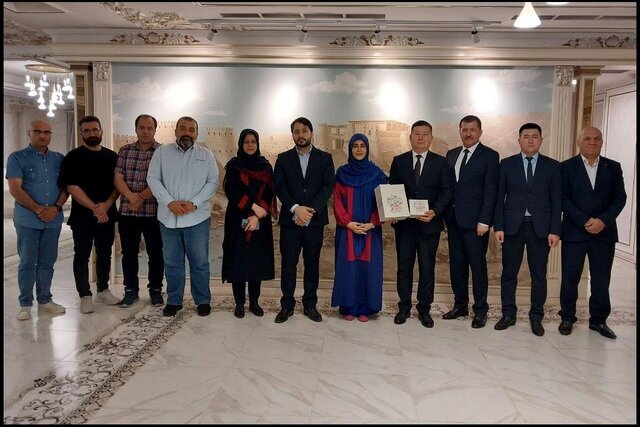TEHRAN – On the third day of his visit to Tajikistan on Sunday, Iran’s Vice-Chairman for the Arts Affairs of the Ministry of Culture and Islamic Leader Nadere Lezai met and discussed with representatives of the Minister of Culture Uzbekistan and the head of the grand theatre in Samarkand.
The meeting took place on the sidelines of the International Professional Theatre Festival, an event in Dushanbe, Tajikistan’s capital city where Rezai attended, Isna reported.
During the meeting, Rezai said that for important historical cities such as Samarkand and Bukhara in Uzbekistan, Iranian cultural and artistic figures are always looking for the cultural and artistic commonalities presented to the audience in the form of various works of the past.
“My colleagues from the Directorate of Dramatic Arts, Music Bureau, Visual Arts Bureau and Education and Planning Bureau are ready to carry out activities in the near future, in order to promote joint collaboration between Iran and Uzbekistan, particularly the performance of the work,” she said.
This path, she added, is certainly the beginning of a new season of artistic activities in both countries, with more careful consideration.
Uzbekistani officials said IRNA and Uzbekistan have many cultural and artistic commonalities.
The path could become a new seasonal prelude to collaborative activities between the two countries in the theatre sector, he added.
“What’s very important to me is the planning and implementation of various programs, especially in the theatre field. This is the beginning of new activities in the field of artistic commonality between the two countries.”
“Given the desired quality of Iranian theatrical works, I am confident that we can hold a large number of events in both countries. To this end, me and my colleagues are ready to review what has been mentioned, as well as to create the necessary measures and plans to sign a cultural and artistic memorandum in the near future,” he concluded.
Earlier this week, Lezai met Tajikistan’s Minister of Culture, Mattolbajon Satrillon in Dushanbe to strengthen his cultural and artistic connections.
Rezai discussed the expansion of collaboration, while Sattoriyon highlighted the shared cultural commonality and recent advances after the president’s visit. Both authorities have expressed preparedness for a new phase of cooperation.
Rezai proposed to invite Tajik artists to Iran’s Fajr Festival in 2026, referring to potential collaborative music projects, including a performance of Rudaki’s poems by an Iranian ensemble and a performance by the son of the late Maestro Davlatmand Kholov.
The possibility of mutual invitations for collaborative students’ musical ensemble and cultural visits was also discussed, highlighting the close artistic friendship between the two countries.
sab/

